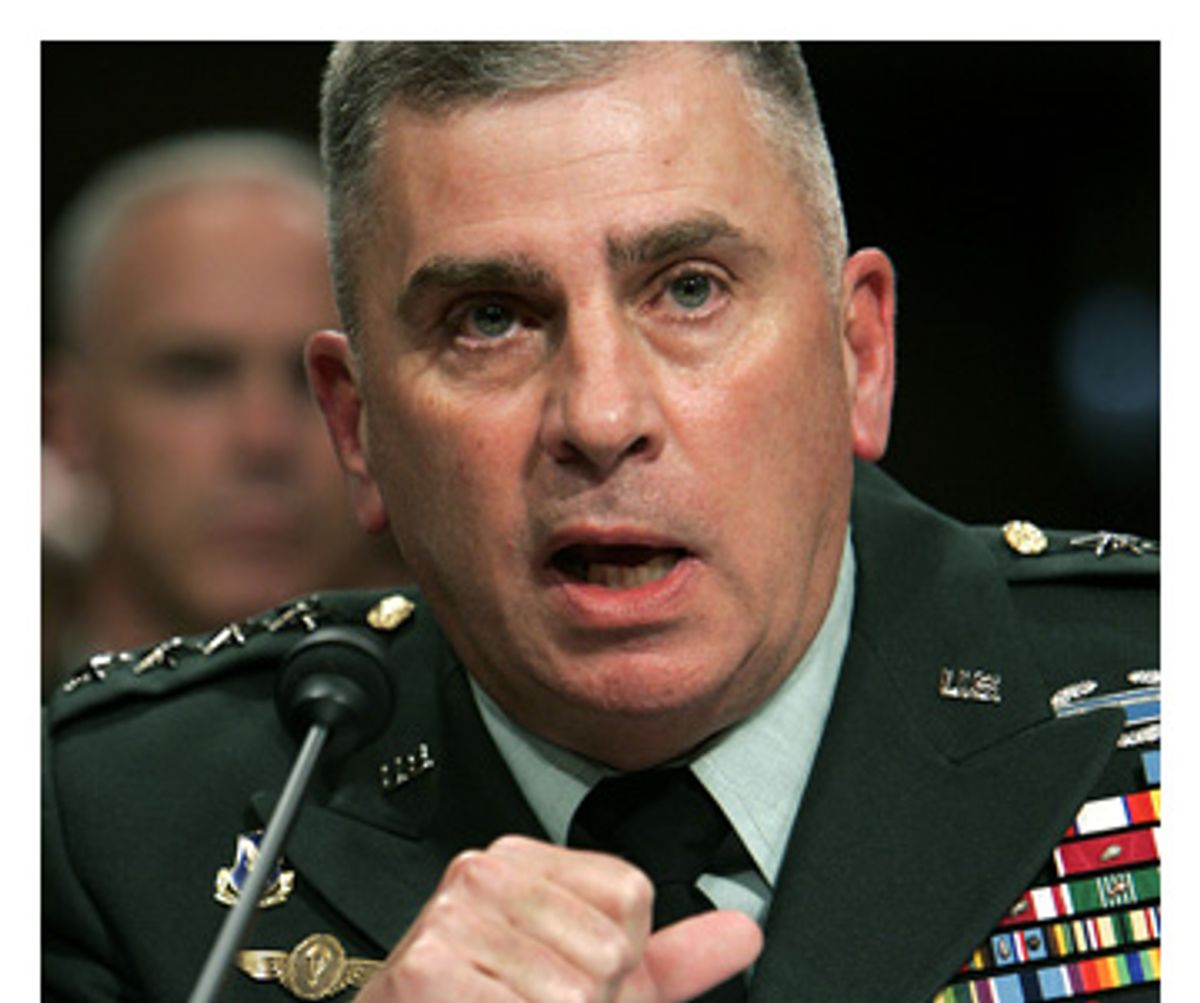In four to six months, on a date that falls between Valentine's Day and Memorial Day, America will know whether the war in Iraq can still be won, according to Gen. John Abizaid, the U.S. military commander for the Middle East. "I think [the violence] needs to be brought down in the next several months," he said Wednesday, when asked when he expected Iraq to pass a "tipping point" of violence and civil unrest. "Four to six months."
He was speaking before the dissatisfied and downtrodden members of the Senate Armed Services Committee, who had gathered to make good on their promise to increase oversight of the White House execution of the Iraq war. With the elections now over, the senators mostly avoided attacking President Bush or questioning each other's patriotism. But stripped of their talking points, they faced the reality of a conflict that will not be won by legislative fiat. The outlook is grim.
According to the Defense Intelligence Agency, the number of daily attacks in Iraq averaged 180 in October, up from 170 in September and 70 in January. "Today, DIA assesses the conditions for the further deterioration of security and instability exists," the agency announced in a statement released Wednesday. "Although a significant breakdown of central authority has not occurred, Iraq has moved closer to this possibility."
Abizaid's prescription: Allow "four to six months" for the Iraqis to calm the sectarian fighting with American help. Let the Iraqi government disband the Shiite militias that are terrorizing parts of Baghdad. Demand that the nation's elected leaders make political progress in reconciling the various ethnic groups. Give the Iraqi police and military more time to take over security. "We want the Iraqis to do more," he said. "It's easy for the Iraqis to rely on us to do the work."
In the meantime, he asked the Senate not to meddle with his military planning, which may include a temporary increase in troop strength to accelerate the training of Iraq forces. Abizaid emphasized that the U.S. needs to boost resources for its military transition teams (10- to 15-man teams known as MiTTs), which live and fight alongside the Iraqi forces. "If more troops need to come in, they need to come in to make the Iraqi army stronger," he said.
Abizaid's focus on U.S. military advisors reflects a need raised months ago by some military officers serving in Iraq -- some of whom contended that the advisor strategy had been neglected by U.S. leaders for the past year. A Salon report in August revealed that "according to more than a dozen Marine and Army officers, since its launch approximately a year ago, the MiTT program has been dogged by bureaucratic mismanagement, inadequate training, and an astonishing shortage of equipment and supplies."
Abizaid also rejected calls for legislative timetables for troop withdrawal, a proposal embraced by Sen. Carl Levin, D-Mich., the chairman-in-waiting of the Armed Services Committee.
None of the senators appeared particularly satisfied by the state of affairs, or Abizaid's comments. "I regret deeply that you seem to think that the status quo, and the progress we are making, is acceptable," charged Sen. John McCain, R-Ariz., a presumptive presidential candidate who advocates more troops to patrol areas of the country outside of Baghdad.
"Senator, I agree with you, the status quo is not acceptable," Abizaid shot back. But he then pointed out that the military was already stretched thin, limiting his options. "We can put in 20,000 more Americans tomorrow and achieve a temporary effect," he said. "But when you look at the overall American force pool that is available out there, the ability to sustain that commitment is just not something we can sustain right now."
New York Sen. Hillary Clinton, another presidential contender, appeared exasperated when she finally got a chance to speak, in the hearing's second hour. "We are really left with very few strategic options other than the continuation of hope," she said, after listing all the options that Abizaid had ruled out, like increasing or decreasing troop strength. She fell back on the adage: "Hope is not a strategy."
But neither was despair a path to success, Abizaid responded. "When I come to Washington, I feel despair," he told Clinton. "When I am in Iraq with my commanders, when I talk to our soldiers, when I talk to the Iraqi leadership, they are not despairing. They believe that they can move the country toward stability with our help. And I believe that. This has been a very hard and difficult process. And over the length of time we have learned some hard lessons."
Abizaid's appearance before the Senate, which was followed by a meeting with the House, was just the first of many hearings to offer a public reexamination of Iraq over the coming weeks. Soon, former CIA director Robert Gates, who has been nominated to replace Defense Secretary Donald Rumsfeld, will come before the Senate to seek confirmation and lay out his vision of success in Iraq. That will be followed by the presentation of the congressionally sanctioned Iraq Study Group, led by James Baker, and by the public presentation of an internal Pentagon study group being led by Gen. Peter Pace, the chairman of the Joint Chiefs of Staff.
But if Wednesday's hearing is any indication, more oversight and study may not reveal any elegant solutions to the problem in Iraq. It might, however, encourage leaders like Abizaid to set up a goal post beyond which continued failure will no longer be acceptable. For the moment, that deadline has been set for next spring -- hardly the first of its kind for allegedly measuring progress. It comes "four to six months" from Wednesday.



Shares